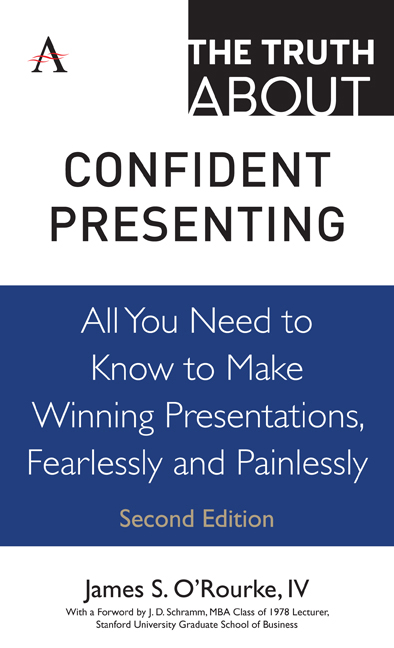 The Truth about Confident Presenting
The Truth about Confident Presenting Book contents
- Frontmatter
- Contents
- Foreword
- Introduction
- Part I Some Initial Truths
- Part II The Truth About Getting Ready to Speak
- Part III The Truth About What Makes People Listen
- Part IV The Truth About Developing Support for Your Presentation
- Truth 19 Develop support for your presentation
- Truth 20 Understand the power of your content
- Truth 21 The kinds and quality of evidence matter to your audience
- Truth 22 Structure can help carry an inexperienced speaker
- Truth 23 Find support for your presentation
- Truth 24 Use the Internet to support your presentation
- Part V The Truth About Getting Up to Speak
- Part VI The Truth About Managing Anxiety
- Part VII The Truth About Nonverbal Communication
- Part VIII The Truth About Visual Aids
- Part IX The Truth About Handling an Audience
- Part X The Truth About What Makes a Presentation Work
- References
- Acknowledgments
- About the Author
Truth 21 - The kinds and quality of evidence matter to your audience
from Part IV - The Truth About Developing Support for Your Presentation
- Frontmatter
- Contents
- Foreword
- Introduction
- Part I Some Initial Truths
- Part II The Truth About Getting Ready to Speak
- Part III The Truth About What Makes People Listen
- Part IV The Truth About Developing Support for Your Presentation
- Truth 19 Develop support for your presentation
- Truth 20 Understand the power of your content
- Truth 21 The kinds and quality of evidence matter to your audience
- Truth 22 Structure can help carry an inexperienced speaker
- Truth 23 Find support for your presentation
- Truth 24 Use the Internet to support your presentation
- Part V The Truth About Getting Up to Speak
- Part VI The Truth About Managing Anxiety
- Part VII The Truth About Nonverbal Communication
- Part VIII The Truth About Visual Aids
- Part IX The Truth About Handling an Audience
- Part X The Truth About What Makes a Presentation Work
- References
- Acknowledgments
- About the Author
Summary
The support you plan to include in your presentation really comes in two basic forms. The first type is factual data in the form of examples or statistics. The second is testimonial evidence or statements of opinion about what is, has been, or is likely to be true in the future. Testimonial evidence is frequently used when a speaker has no factual basis available for judgment. It's needed when the presenter wants to make a prediction about what will happen in the future as a result of our taking some current action.
Let's begin by considering testimonial evidence. The quality of factual and opinion evidence is best judged by the characteristics of the source of the testimony. There are several ways to gauge the reliability of a source:
Objectivity and accuracy record. Some sources have a reputation for objectivity and accuracy, while others do not. Government agencies, such as the U.S. Census Bureau and the Bureau of Labor Statistics, for example, are generally considered to have very good records for providing accurate, unbiased information. The executive branch of the government doesn't have such a good record. Political appointees in that branch often release information that has an ideological or political bias— and this is true of both parties, really— to help achieve political objectives. The Wall Street Journal is considered to be more accurate and, at least on the news pages, more objective than, say, The National Enquirer.
Expertise and knowledge of facts. In the case of opinion evidence, a person's expertise and experience in a field are crucial. In fields such as criminology, medicine, economics, foreign affairs or archeology, the opinions of people with appropriate education and experience are generally trusted over those of a lay person or nonexpert. However, keep two key points in mind. First, expertise is subject-specific. Just because your dentist knows something about root canals and gingivitis doesn't mean he knows anything about the stock market. Second, even lay persons without any special forms of expertise may be just as 21 reliable as an expert when reporting observed facts.
Consistency. This test has two aspects. The first is internal consistency; for example, does a particular source contradict itself in reports spread over an extended period of time or within the same report? The second aspect is that the information given by a source should be consistent with other sources.
- Type
- Chapter
- Information
- The Truth about Confident PresentingAll You Need To Know To Make Winning Presentations, Fearlessly And Painlessly, pp. 81 - 84Publisher: Anthem PressPrint publication year: 2019
